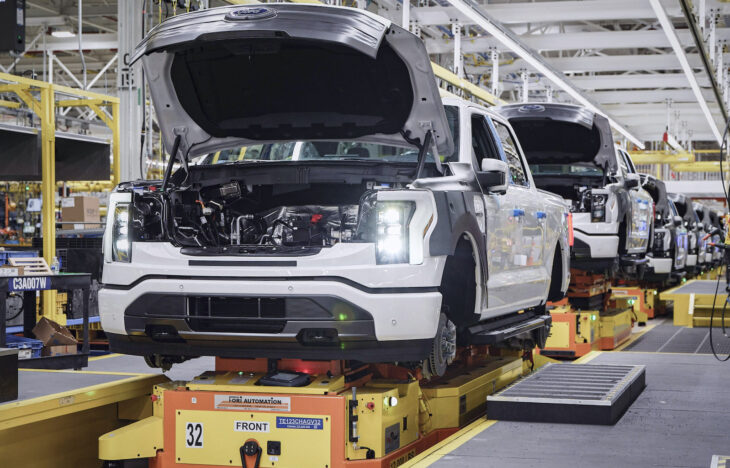Rio Tinto and Ford Motor Company signed a non-binding global memorandum of understanding (MOU) to jointly develop more sustainable and secure supply chains for battery and low-carbon materials to be used in Ford vehicles.
The multi-materials partnership will support the transition toward a net-zero future by supplying Ford, one of the world’s largest automakers, with materials including lithium, low-carbon aluminum, and copper. Accordingly, this will allow Rio Tinto to progress its commitment to work with customers to decarbonize value chains.
Low Carbon Aluminum
The companies will work to cooperatively strengthen the supply of low carbon aluminum for use in Ford vehicles, including metal produced using the zero carbon ELYSIS™ smelting technology and from Rio Tinto’s hydro-powered operations in Canada.
The MOU builds on Ford’s relationship with Rio Tinto as a primary aluminum raw material source for its iconic F-150, the world’s first all aluminum body pick-up truck. The high-strength aluminum alloys used in the Ford F-150 help improve performance and save weight, helping it to tow heavier loads, accelerate quicker, and reduce stopping distances. Now, the companies will work together exploring what’s possible in the energy transition with models like Ford’s next-generation full-size electric truck, the F-150 Lightning.
“We are excited to work with Ford to support the transition to net zero by supplying a range of materials it needs for electric and lower-carbon vehicles, and advance our commitment to work with customers to decarbonize our value chains,” said Alf Barrios, Rio Tinto chief commercial officer. “Rio Tinto is uniquely positioned to work with companies like Ford to develop more sustainable, traceable, and secure supply chains. We are investing to grow in materials needed for the energy transition and in technology and partnerships to decarbonize our business and value chains.”
Other Materials
Ford and Rio Tinto will also work to develop secure, domestic supply chains for Ford across other essential commodities for the energy transition from Rio Tinto’s operations in North America, including copper produced with a low-carbon footprint.
Furthermore, under the agreement, Ford will explore becoming the foundation customer for Rio Tinto’s Rincon lithium project in Argentina. Rio Tinto is currently progressing detailed planning to bring Rincon into production and will work with Ford toward a significant lithium off-take agreement to support its production of electric vehicles.
“This is a powerful example of how Ford’s proven scale and industrial expertise can be leveraged to accelerate the shift to EVs,” said Hau Thai-Tang, chief industrial platform officer at Ford. “We’re applying years of shared knowledge and a strong relationship to support production of models customers already know and love – and potentially to help create a new generation of EVs for millions of customers.”

